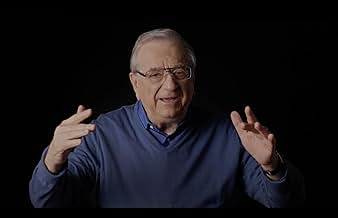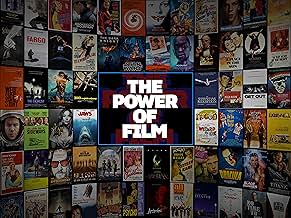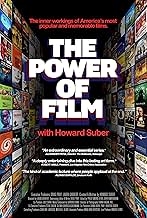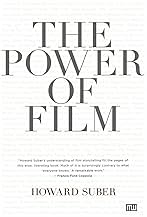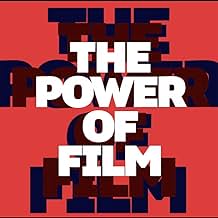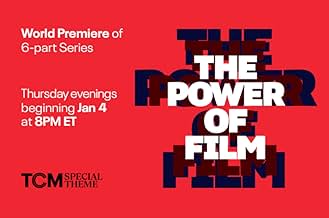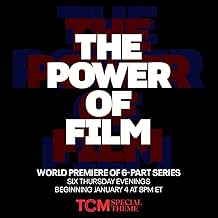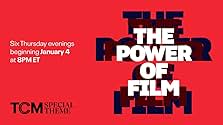Dives deep into the art of storytelling by examining the defining principles and inner workings of the most popular and memorable American films of all time.Dives deep into the art of storytelling by examining the defining principles and inner workings of the most popular and memorable American films of all time.Dives deep into the art of storytelling by examining the defining principles and inner workings of the most popular and memorable American films of all time.
- Star
Browse episodes
Featured reviews
Mind-numbingly boring and shallow, Professor Blabbermouth takes us into the world of film with nothing new to say while stating the incredibly obvious. If we only had to rely on what this guy says, I doubt anyone other than his immediate family would make it through this (I dropped out after one episode). There are a million film clips that prop up this bore, but they aren't enough to add up to entertainment. The first episode is completely all over the place and makes not much of a point, and the point made isn't much and hardly warranted forty minutes to tell. He should just write down his point on a 3X5 index card and let viewers watch a real movie.
I am finding this documentary to be very powerful and enjoyably enlightening. Howard Suber has taught film classes at UCLA for 50 years, and he offers insights into writing, directing, characterization, fate and destiny, heroes and villains.
There are numerous clips from all kinds of movies as Professor Suber himself talks directly to the camera about whatever the subject may be. I was a TCF (telecommunications and film) major myself while in college in the mid-1970s, and I had some excellent professors, but listening to this man actually makes me want to take a class from him even today.
This is a superb documentary on TCM and hosted by Dave Karger, who is able to speak to director of the series, Laura Gabbert, and to writer, Doug Pray, both of whom had Suber as a professor in college. Simply well done all around.
There are numerous clips from all kinds of movies as Professor Suber himself talks directly to the camera about whatever the subject may be. I was a TCF (telecommunications and film) major myself while in college in the mid-1970s, and I had some excellent professors, but listening to this man actually makes me want to take a class from him even today.
This is a superb documentary on TCM and hosted by Dave Karger, who is able to speak to director of the series, Laura Gabbert, and to writer, Doug Pray, both of whom had Suber as a professor in college. Simply well done all around.
This series offers some interesting things to think about but, it seems the professor's train of thought is all over the place. The same few films from more recent years are used from episode to episode, over and over as examples of what his point is. There are so many other films from the classic era that could have been used instead of so many repeat of contemporary films.
I does contain some interesting insights as to what might create a successful screenplay.
The video image of some of the clips at times has a strobing effect that was a bit off-putting.
I so wanted to love this series but it leaves me a bit flat.
I feel it was a missed opportunity to mine the wealth of film material from the past.
I've seen 5 of the 6 episodes so far.
I does contain some interesting insights as to what might create a successful screenplay.
The video image of some of the clips at times has a strobing effect that was a bit off-putting.
I so wanted to love this series but it leaves me a bit flat.
I feel it was a missed opportunity to mine the wealth of film material from the past.
I've seen 5 of the 6 episodes so far.
A collection of movie clips overlaid by narration which is shallow, says pretty much nothing of value and often contradicts itself. The professor will name a "pattern" (usually the vaguest possible theme like "family") and then proceed to illustrate it with examples of movies, hilariously including some, which do not actually feature the stated "pattern" at all.
You are better off watching amateur film montages on youtube, at least they focus on the movies themselves and do not add pretentious, yet meaningless voiceover.
The attempted analysis is very superficial and sometimes almost sounds like a parody. Like this gem of deep thinking: "It was a fatal accident, so it must have something to do with fate". Definitely a fine example of "those who cannot do, teach".
You are better off watching amateur film montages on youtube, at least they focus on the movies themselves and do not add pretentious, yet meaningless voiceover.
The attempted analysis is very superficial and sometimes almost sounds like a parody. Like this gem of deep thinking: "It was a fatal accident, so it must have something to do with fate". Definitely a fine example of "those who cannot do, teach".
"The Power of Film" is an Incredibly succinct, refined, distilled, and evidence-based look at what makes a good story on screen. If I were an inexperienced woodworker, and this series were about saws, after watching it there would not be a lot standing between me and a viable career in carpentry. His analysis reaches back to the foundational achievements of the plays of ancient Greece, but he doesn't start there or end there. He updates them using this era's most memorable films, seamlessly, but starting from today and integrating backward. I learned so much about what makes great, enduring, archetypal comedy/tragedy stories, and then so much more about doing it on screen. Depicted in detail and depth is "What makes a modern immortal film.". I know it will delight writers, directors, and even cinematographers.
Personally, I have been mulling for years on an idea for a Sci-Fi story of novel/screenplay length. The idea is good, I felt, but I was getting nowhere with the execution. I watched "The Power of Film" by coincidence and by episode three I was thinking OMG WTF. The problems I was having were incredibly simple. Obvious, timeless and ubiquitous formulas were absent and when they were spelled out to me I was suddenly, fully deconstipated. I filled half of a tablet about what was really going on in my mind, what was missing. My story had been malformed and stunted by inexperience and lack of tools. You might think: "oh, he abandoned his grand vision in favour of formulaic tripe", but it was the very opposite.
I had tried to achieved a setting, a feeling, a loose plot, a grand vision, but a ton of ambiguity dominated it because of a lack of overarching form...I was lost inside scenes. This series revealed to me what I really wanted to say, and a greater plot emerged that actually made sense. I shared this with a peer and the next day they told me "I've been thinking about your story" and started asking questions about it. I finally had answers.
If you are an aspiring screenwriter or author, and you are stuck...these episodes are capable of un-sticking you. This series is an absolutely must-see for creators and consumers both.
Personally, I have been mulling for years on an idea for a Sci-Fi story of novel/screenplay length. The idea is good, I felt, but I was getting nowhere with the execution. I watched "The Power of Film" by coincidence and by episode three I was thinking OMG WTF. The problems I was having were incredibly simple. Obvious, timeless and ubiquitous formulas were absent and when they were spelled out to me I was suddenly, fully deconstipated. I filled half of a tablet about what was really going on in my mind, what was missing. My story had been malformed and stunted by inexperience and lack of tools. You might think: "oh, he abandoned his grand vision in favour of formulaic tripe", but it was the very opposite.
I had tried to achieved a setting, a feeling, a loose plot, a grand vision, but a ton of ambiguity dominated it because of a lack of overarching form...I was lost inside scenes. This series revealed to me what I really wanted to say, and a greater plot emerged that actually made sense. I shared this with a peer and the next day they told me "I've been thinking about your story" and started asking questions about it. I finally had answers.
If you are an aspiring screenwriter or author, and you are stuck...these episodes are capable of un-sticking you. This series is an absolutely must-see for creators and consumers both.
Details
- Color
Contribute to this page
Suggest an edit or add missing content


